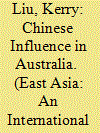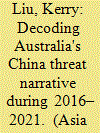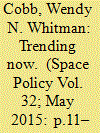|
|
|
Sort Order |
|
|
|
Items / Page
|
|
|
|
|
|
|
| Srl | Item |
| 1 |
ID:
178165


|
|
|
|
|
| Summary/Abstract |
Australia—China relations, and especially Chinese influence in Australia, have been the subject of heated debate in Australia since 2016. The central issue is, how to balance concerns over Chinese influence in Australia with the economic benefits of Chinese trade and investment? This study—arguably the first of its kind—answers this question using rigorous empirical modelling. First, it uses Google Trends search results to measure Chinese influence in Australia. Second, it connects Chinese influence, as reflected in Google Trends search results, to financial markets, including stock markets, government bond markets and foreign exchange markets. Weekly data for January 2016–December 2019 are entered into an exponential generalised autoregressive conditional heteroskedastic model. The study finds that the effects of concerns over Chinese influence relate mainly to increased volatility of stock market indices and government bond yields, and downward pressure on the share prices of individual firms that are heavily exposed to Chinese markets. However, the overall effects appear to be minor or insignificant. The implications of these results are that China’s economic coercion (if any) may not be effective, and Australia’s responses to Chinese influence and interference (if any) may generate insignificant costs. Finally, this study makes original and significant academic contributions to academia by providing a novel framework for exploring international relations.
|
|
|
|
|
|
|
|
|
|
|
|
|
|
|
|
| 2 |
ID:
191115


|
|
|
|
|
| Summary/Abstract |
Australia–China relations began to sour in 2016, and the China threat narrative began to dominate since then. Unlike previous studies which either use a qualitative approach or cross-sectional dataset for empirical analysis, this study creatively creates high-frequency weekly and monthly time series datasets using the Google Trends search results during January 2016–February 2021. Based on a series of time series modellings, this study examines the roles of various actors, including China's own policies, the Australian Strategic Policy Institute and Clive Hamilton, various factors, including Chinese purchase of Australian housing, Chinese investment in Australia, Chinese students in Australia and China's rise and various media outlets, including the Australian Broadcasting Corporation, Australian Financial Review, Sydney Morning Herald, Daily Telegraph and Herald Sun, in contributing to Australia's China threat narrative. This study makes significant contributions to academia in methods by bringing a new quantitative approach to international relations studies and to policy-makers as well by quantifying the roles of various actors, factors and media outlets in Australia's China policy debate.
|
|
|
|
|
|
|
|
|
|
|
|
|
|
|
|
| 3 |
ID:
161881


|
|
|
|
|
| Summary/Abstract |
We evaluate factors affecting the demand for MOOC by estimating its demand function in OECD countries and in China. We apply a Big Data approach to construct a proxy for MOOC demand using Google Trends for OECD and Baidu Index for China. Based on estimation results of various panel data models, we find that in both cases, higher unemployment promotes MOOC demand. However, in OECD countries, the proportion of individuals with high school level or higher education have positive and significant effects on MOOC demand, while in China, we observe positive and significant effects from internet speed and average income.
|
|
|
|
|
|
|
|
|
|
|
|
|
|
|
|
| 4 |
ID:
169911


|
|
|
|
|
| Summary/Abstract |
This paper provides empirical evidence that suicide attacks systematically draw more media attention than non-suicide terrorist attacks. Analyzing 60,341 terrorist attack days in 189 countries from 1970 to 2012, I introduce a methodology to proxy for the media coverage each one of these attack days receives in the New York Times. Suicide attacks are associated with significantly more coverage. In the most complete regression, one suicide attack produces an additional 0.6 articles—a magnitude equivalent to the effect of 95 terrorism casualties. This link remains robust to including a comprehensive list of potentially confounding factors, fixed effects, and country-specific time trends. The effect is reproduced for alternative print and television outlets (BBC, Reuters, CNN, NBC, CBS), but remains weak for Google Trends (worldwide and in the U.S.), a more direct proxy for people’s interests, and is non-existent for C-SPAN, a television station dedicated to broadcasting political discussions directly. Thus, the media appears to cover suicide missions in an extraordinary fashion, which may in turn explain their prominence among terrorist organizations.
|
|
|
|
|
|
|
|
|
|
|
|
|
|
|
|
| 5 |
ID:
150871


|
|
|
|
|
| Summary/Abstract |
In this paper, we analyzed how the CAFE standard has affected improvements in the fuel economy of vehicles, as examined in other preceding studies, but in addition, we also analyzed how these standards have affected the level of consumer interest in fuel economy. Our goal was to determine what effects the government intervention has had on consumers, and whether such intervention ought to be continued. The results showed that not only has the CAFE standard had a direct and significant impact on improving fuel economy and increasing the market share of fuel-efficient vehicles, it has also boosted the development of technologies for enhancing fuel economy and raised consumer interest in fuel economy, thus indirectly contributing to overcoming market failure. The significance of this study is that we used publically available observed data and analyzed the recent impact of the CAFE standard specifically with a focus on the behavior and strategies exhibited by consumers and automakers. Another significance of this study is that it extends our purview to examine the effects that the CAFE standard has had in other countries (Korea).
|
|
|
|
|
|
|
|
|
|
|
|
|
|
|
|
| 6 |
ID:
142555


|
|
|
|
|
| Summary/Abstract |
This article addresses a timely and widespread issue, that of public opinion and the rise of “big data.” Analysts of US space policy have consistently noted the role that public opinion plays in setting the directions for US space exploration. However, the tools that have been used to measure public opinion suffer from serious shortcomings in terms of timing and lack of available data. This paper introduces two new measures of public opinion, Google Trends and Twitter, and details how they can be used to assist in measuring interest in space policy in the American public.
|
|
|
|
|
|
|
|
|
|
|
|
|
|
|
|
|
|
|
|
|